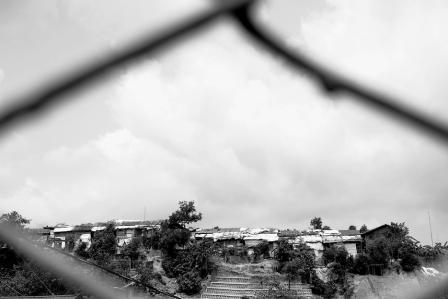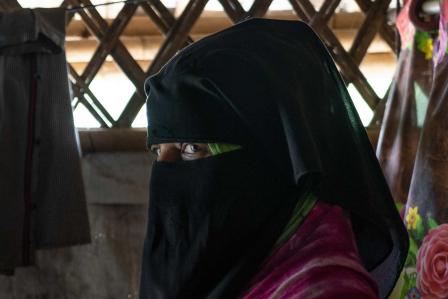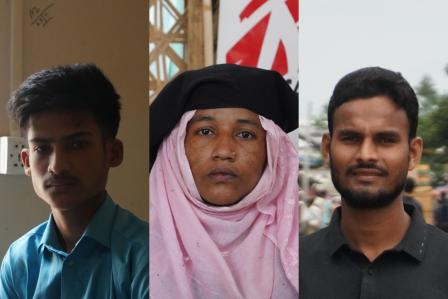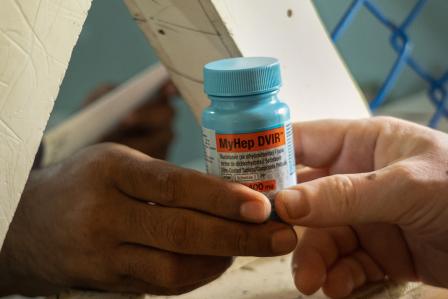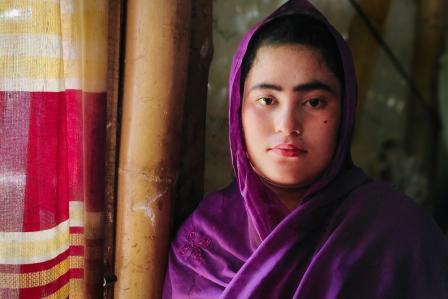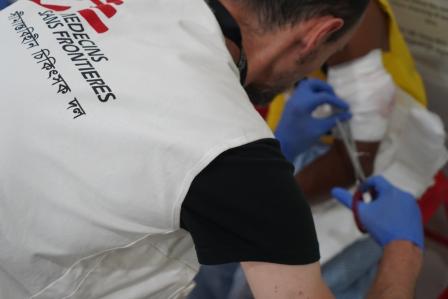Rohingya: 5 years, 5 stories
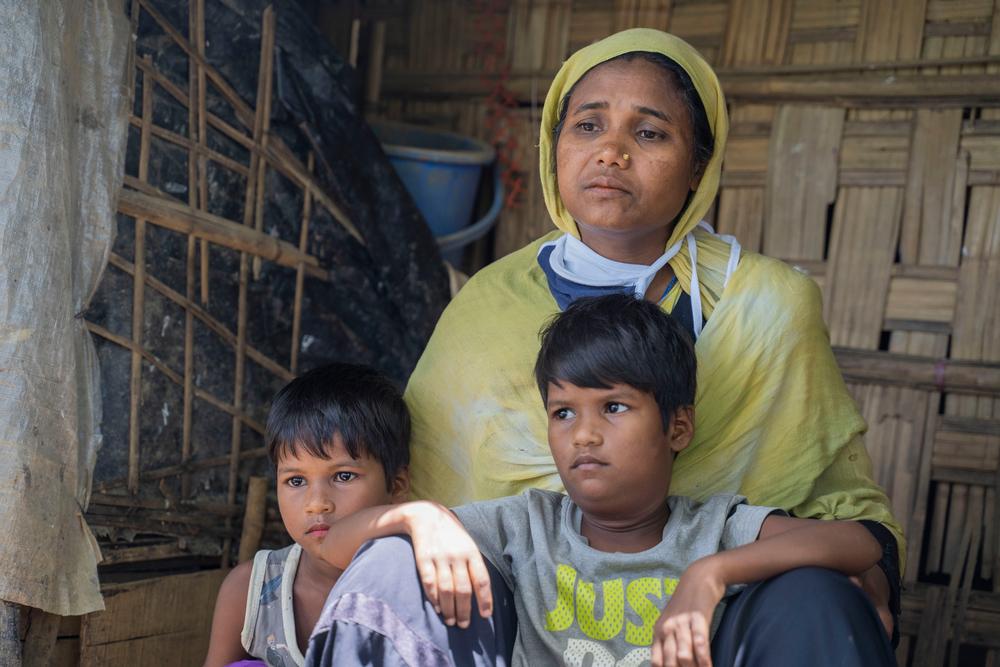
“When I fled with my babies, we crossed jungles and muddy roads in the soaking rain to get to Bangladesh. The journey was difficult, especially with children.” Tayeba Begum, mother of 5 years old twin shared her experience of escaping the in 2017. “You can keep us here or transfer us to another country, we will not refuse. If we can ever live peacefully again in Myanmar, we will return. Why wouldn’t we return if justice is served to us and we are given citizenship? Is it not our homeland also?” Bangladesh, 2022. © Saikat Mojumder/MSF
Doctors Without Borders / Médecins Sans Frontières (MSF) spoke with five Rohingya people living in refugee camps in Cox’s Bazar, Bangladesh, to understand how they see their lives five years since being forcibly displaced from Myanmar. Representing the ages five, 15, 25, 45 and 65, together they span three generations of Rohingya living in the camps. They are all current or former patients of Doctors Without Borders.
5 - long for peace
Tayeba Begum is a mother of six children, including two five-year-old twins. She fled Myanmar in 2017 with nothing but the clothes on her back. Now, five years later, Tayeba describes life in the camps for the twins and herself. Despite longing to go back home, she says it is difficult to return to Myanmar without knowing if her rights would be ensured.
- Tayeba's story
“My twin girls, Nur Ankis and Nur Bahar, were only six-month-old babies when we escaped from our homeland in Myanmar. I ran with them. All we had with us were the clothes we were wearing.
After the killings began, we couldn’t stay in Myanmar any longer. We had to save ourselves. The military were brutally murdering Rohingya and burning their houses.
Even two years prior to us leaving in 2017, young men were being taken and tortured. At the time, my son was afraid and left for India. He’s still there.
When I fled with my babies, we crossed jungles and muddy roads in the soaking rain to get to Bangladesh. The journey was difficult, especially with children. After reaching the border, people were resting wherever they could, but there was nowhere to shelter. We sat in the bushes or under trees if it rained heavily, waiting and hoping for assistance.
We ate whatever we could find to survive. My daughters became weak and vomited whenever I tried to feed them. They suffered for a long time as it was difficult to find medicine when we arrived.
A few days after our arrival [to Cox’s Bazar], shelters were built for us out of cloth and bamboo. Now, we live here in the refugee camps. My twins are five years old now. It has been five years of living in distress.
We have shelter, but beyond that, we do not have much for our children. We depend on food assistance and worry about what to feed them and if it’s enough. We worry about how to clothe them and how to educate them.
I cannot provide what they need as I have no money. Sometimes I eat less than I should because in my heart, I want to sell the extra food to buy my children something.
This is how we are living – half fed. Otherwise, I cannot buy my children anything.
Sometimes I hear from my son in India. He calls every two or three months. I don’t have a mobile phone and can only speak with him when he calls someone else’s.
I have not seen him for years and I miss him and my home in Myanmar terribly. I long for peace. If we can ever live peacefully again in Myanmar, we will return. Why wouldn’t we return if justice is served to us and we are given citizenship? Is it not our homeland also? But how can we return if our rights are not ensured? Where will we live, since our houses have been destroyed? How can we go back if our children could be taken away and murdered?
You can keep us here or transfer us to another country, we will not refuse, but I would not go back to Myanmar without justice being served.”
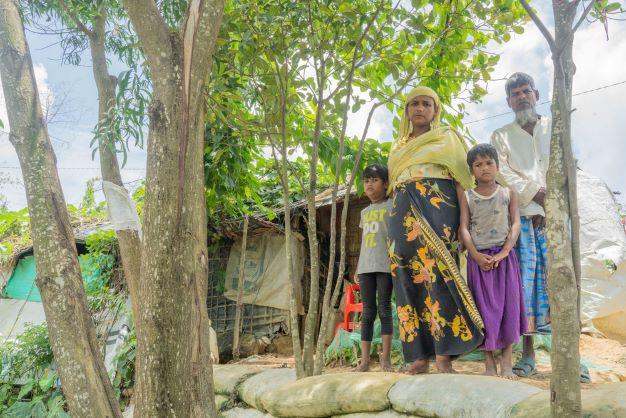
“We depend on food assistance and worry about what to feed them and if it’s enough. This is how we are living - half fed. Otherwise, I cannot buy my children anything.” Tayeba Begum, Rohingya refugee describes her life in the camps. Bangladesh, 2022. © Saikat Mojumder/MSF
15 - I have a dream to become a doctor, but I don’t think it will come true
Anwar, 15 years old, still clearly remembers fleeing Myanmar five years ago. At home, he was a good school student with dreams. Now, he is anxious about how his life will unfold.
- Anwar's story
“My name is Anwar. I am a school student from Myanmar. I’m 15 years old, almost 16. We escaped our neighbourhood in Myanmar and now live in the Jamtoli refugee camp in Bangladesh.
I remember the time when I ran away from Myanmar with my family. It was one afternoon, when the army attacked our neighbourhood and we had to run to a nearby area. When they torched our houses, we had to run further. We survived but many of relatives and neighbours were murdered.
We travelled a long way to seek safety. I remember it was almost 12 days of running and walking before we reached Bangladesh. It was dangerous: we walked unfamiliar roads, climbed hills and even crossed water. We saw a lot of dead bodies on the way.
When we first arrived in Bangladesh, we stayed with our relatives and neighbours, and now we live in this shelter in the camp.
I was a student at school when we escaped, so when I came here my education was interrupted. I was a good student with high grades. I like learning, but now, I can’t study or get the books I need.
Only primary level education is available in the Rohingya refugee camps, nothing further. Our education is stuck where we left it. The only chance for learning is when teachers in our community gather up the Rohingya children to teach them. They teach us wholeheartedly.
Some of my friends miss classes because they are responsible for supporting their families. I feel for them. If they become educated, they can teach others and create a ripple. Only then will our community develop and our generation will do good.
My dream was to become a doctor, to be useful to the community. Since my childhood, I have seen doctors helping people and doing their best. I understand now that the dream might never come true. Still, I feel happy when I go to classes and meet my friends. We try to be happy while studying and playing.
Our life in the camp is not easy. The incentive my father earns is not enough for supporting my family. And sometimes when I come back from school at night I feel unsafe.
I would like to address young people like me around the world. Please use the opportunity you have and learn as much as you can. My fellow Rohingya refugees and I do not have such an opportunity.”
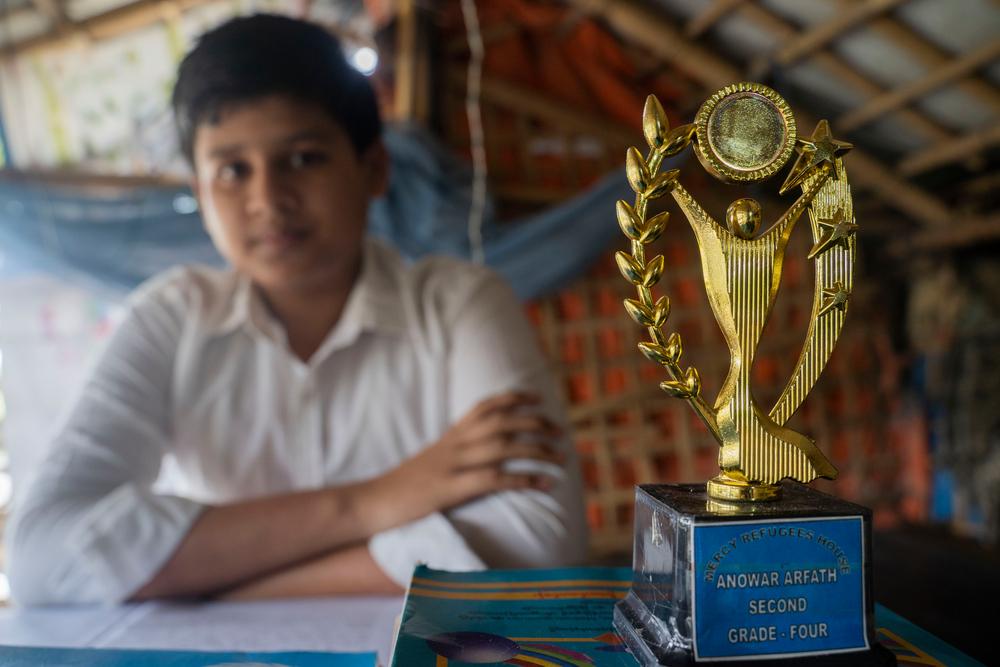
“I have a dream to become a doctor but I think it will not come true. The education available in the Rohingya refugee camps is only for primary, no further. Our education is stuck where we left it.” Anwar Arafat, 15 years old Rohingya who escaped from Myanmar in 2017 and now living in the Jamtoli Refugee camp in Bangladesh. Bangladesh, 2022. © Saikat Mojumder/MSF
25 - I worry about my children and building a future for them
Nabi Ullah, 25 years old, fled to Bangladesh with his family in 2017. Not everyone in the group they escaped with survived the journey. Now, five years later, Nabi Ullah and his wife reflect on what it would take for them to be able to return to Myanmar.
- Nabi's story
“In Myanmar, I worked as a farmer,” says Nabi. “I cultivated land up in the hills and we fed ourselves with the harvests. There was no need to earn money as we grew our own food.
“When the army came [in 2017], I was left unconscious after they tortured me. My neighbours were slaughtered and burnt; others went missing. They set fire to the whole neighbourhood. We needed to escape. I packed some medications, gathered my strength and my family, and left.”
“While we were escaping through the hills, around 10 people in the group we were with were killed,” says Nabi’s wife. “My husband, his parents and I survived, but my family didn’t make it. I lost my parents and siblings. We had to leave them behind and crossed the border into Bangladesh.”
“After crossing the border, the Bangladesh government gave us shelter and food, says Nabi. “Then we were sent to these camps. I miss Myanmar.
“I have one son and two daughters. My son was born here in the Doctors Without Borders hospital. He is one-and-a-half years old. My daughters were born in Myanmar. My wife is now pregnant with another child.
“We rely on food assistance and struggle to pay for the other things we need, like buying clothes for the children. We are in a dire situation.
“Here in the camps, people suffer from fevers, diarrhoea, sore throats and other diseases a lot. When I catch a fever, my throat swells and I have difficulty breathing. On one occasion, I was taken to Kutupalong hospital by ambulance and was admitted for three days because I needed oxygen.
“I go to Doctors Without Borders whenever I feel any discomfort and I also take my children to Doctors Without Borders for different kinds of ailments. I worry about my children and building a future for them. I want education for them. There is no bigger wealth than education. Life here will be even more difficult when our children grow up without an education.
“We all miss our home terribly. I do not even feel like eating when memories of Myanmar come back.
“We are forever thankful to the Bangladesh government for supporting us. Thanking the government will never be enough for supporting so many families. It is just that we want to go home. I always think about what would help us get back to Myanmar.
“We can only return if the government accepts us as citizens and returns our houses, lands and documents. We want to go to the place where our rights will be ensured.”
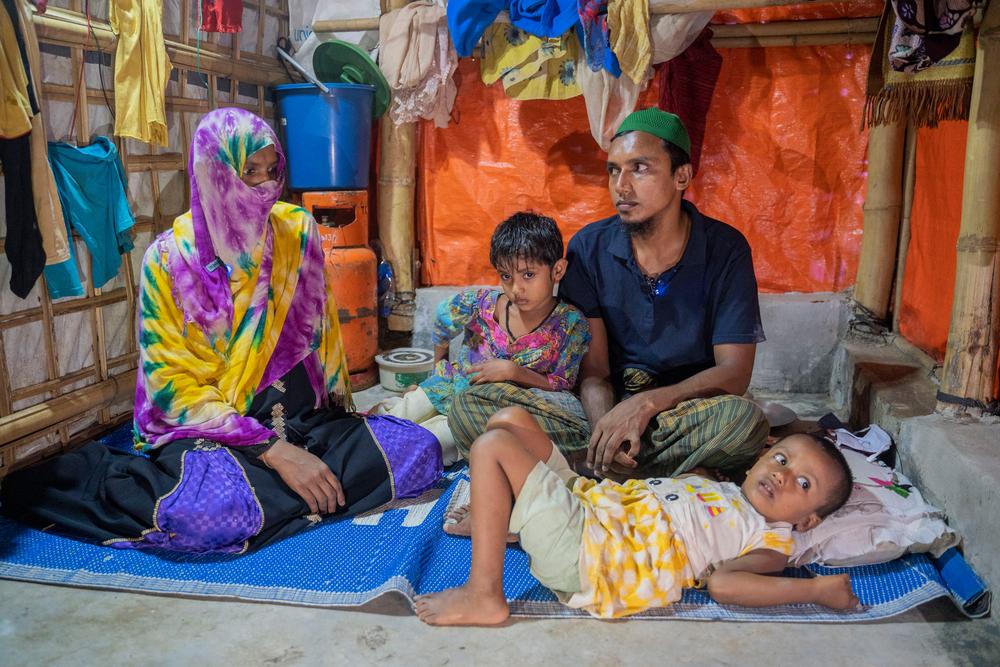
Nabi Ullah, 25 years old who fled to Bangladesh in 2017. “I have one son and two daughters. My son was born here in the Doctors Without Borders ospital. He is one and half years old. My daughters were born in Myanmar. My wife is now pregnant with another child.”- said Nabi Ullah in his testimony. Nabi Ullah and his wife are worried about their children’s future. “I worry about my children and building a future for them. Life here will be even more difficult when our children grow up without an education.” Bangladesh, 2022. © Saikat Mojumder/MSF
45 - Our shelters are still as temporary as when we arrived
On the night before 45-year-old Hashimullah fled Myanmar, he woke to the sound of bullets. The next morning, he made his escape. Five years later, from his hospital bed in Doctors Without Borders acility of Cox’s Bazar, his vivid memories of the scenes of his fleeing make him question if it will ever be safe enough to go back.
- Hashimullah's story
“We arrived in Bangladesh in 2017. We came here because Rohingya were being arrested and murdered in Myanmar.
Our neighbourhoods were burning one after another. Bombs were thrown from planes. We observed this situation for eight days, hoping things would calm down. But things only got worse.
One night at around 4 am, when everyone was asleep, it started raining bullets. Everyone was scared.
In the morning, we saw dead bodies floating in the canals. Some people were still alive, but no one went over to them. The military were heading towards the area where we were hiding. Everyone was scared for their lives and started fleeing wherever they could. So many Rohingya were slaughtered.
But even before 2017, men were being abducted, women were being raped, and the military was taking our livestock.
On the day we fled, a huge number of people gathered on the border. People sent boats from Bangladesh for us to cross to safety in.
We were a large group. Many people drowned in the sea on the way to Bangladesh. I survived the journey and reached Shah Porir Dwip [an island on the Bangladesh side of the border]. From there, we were taken to Teknaf [in Cox’s Bazar] in vehicles provided by the Bangladesh government and local people gave us some food and money.
Then we moved to Kutupalong, where we were assigned different camps. At first, we didn’t have any materials to build a shelter with. Later, the government of Bangladesh gave us shelter materials and we started to build them.
Now I have been here for five years. Two years ago, I became ill. I was feeling dizzy and felt discomfort in my chest. I became unconscious and was brought to Doctors Without Borders’s hospital in Kutupalong. The doctor told me he found a block in my heart. I underwent treatment here for 16 days and finally got better.
We are suffering from many diseases here. Our shelters are still the same temporary shelters as when we arrived – they have endured extreme weather. We really need some more shelter materials, but it’s difficult to find any with the movement restrictions in the camps. Fences were put up, and we cannot move around like before.
The government provides us with some food items, and we are thankful for the things we receive, but sometimes it’s not enough and we need to try to buy fish.
Some of us worked as fishermen in Myanmar, and some were farmers. We have escaped here, but our hearts are still there at home. I lived by the riverside. I had a decent living as my business was selling fishing nets and my children caught fish.
At that time, it was safe for us in Myanmar, and we could move around. But we could not enjoy our earnings because of the military. If we imported and registered five cows, we had to give them two. We had to pay 60,000 kyat to the military if our daughters were to be married. If someone wished to build a house, he had to pay 500,000 kyat to hire a surveyor.
Even if our hearts yearn to go back, how can we if our safety is not ensured? If the world decides that we can be [safely] repatriated, only then will we go. My only need is the right to live with dignity in Myanmar, as we are doing here. Millions of Rohingya want to enjoy their rights and to be safe at home.”
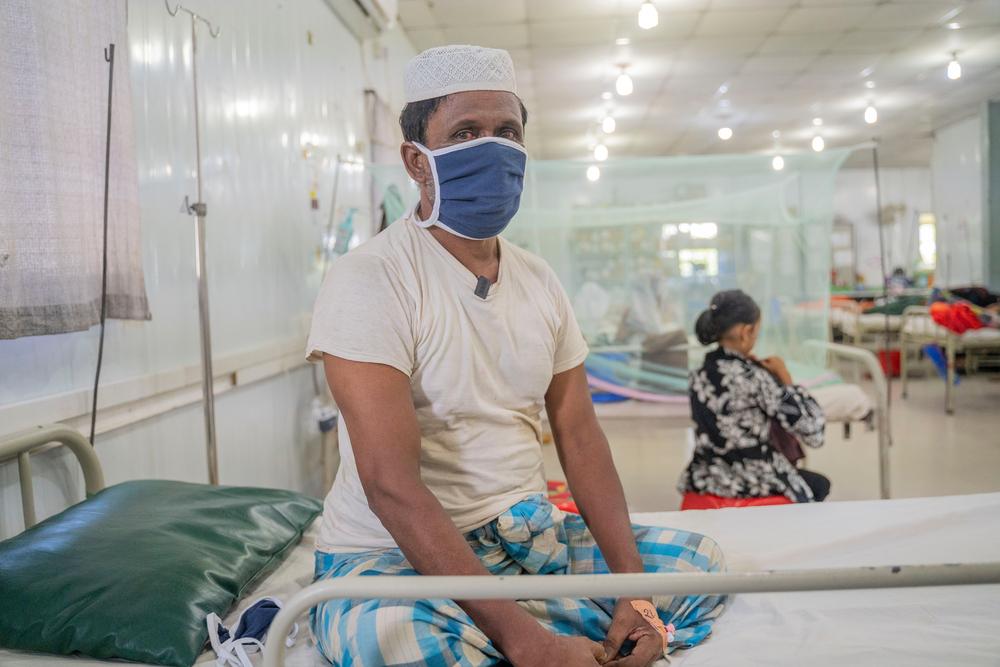
Hashimullah, 45 years old Rohingya fled Myanmar in 2017. Now, he is living in the Rohingya Refugee camp, Bangladesh. “Even if our heart wants to go back, how can we if our safety is not ensured? If the world decides that we can repatriate, only then we will go.” Said Hashimullah. Bangladesh, 2022. © Saikat Mojumder/MSF
65 - We were treated as pariahs, and gradual deprivation turned into persecution
Razi* worked as a civil clerk under the Home Minister’s office in Myanmar for more than 38 years. In 1982, he was stripped of his citizenship because of his ethnicity as a Rohingya. Since then, Razi has seen his rights and freedoms eroded. He was forced to flee to Bangladesh and has been in the camps for five years.
*Name changed to protect patient identity
- Razi's story
“I passed high school in 1973. I even had a job as a government employee because at the time, Rohingya were recognised under the constitution. They appointed us directly after checking if we had completed high school.
After achieving independence from British rule in 1948, the government accepted us as citizens. If someone's father was born in Myanmar and the son was as well, both could be recognised as citizens. People of every ethnicity enjoyed equal rights. No one faced discrimination.
This all changed in 1978, when the Naga Min, or ‘Dragon King census was conducted. The census determined who was a citizen of Myanmar and who was Bangladeshi. Many people were arrested for not having proper documents. Scared for my life, I fled. Later, the government of Myanmar took us back again. They made an agreement with the Bangladesh government, and we were promised if we returned, our rights would be guaranteed. This promise was not kept. The lands were returned to their owners, but our rights were not ensured. This was the beginning of our oppression. We were treated as pariahs and gradual deprivation turned into persecution.
The authorities stripped us of our citizenship [in Myanmar]. Under the [1982] Citizenship Law, they recognised categories of ethnicity, and percentages of each were announced. This categorisation had not existed before.
At this time, despite our citizenship being taken away, Rohingya were still accepted in the country as foreigners. Different regions broadcast the news of Rohingya communities. After the military takeover, our radio airtime was cancelled.
If we are truly foreigners, why did the old constitution not recognise us as foreigners?
We were not allowed anymore to pursue higher education. Travel restrictions were imposed, and the military accused us of being involved in conflict with the Buddhists. Reputed members of the Rohingya community were arrested or fined due to allegations of oppressing the Buddhists. Curfews were enacted and if someone was found visiting another house, he was tortured. So, we started keeping our mouths shut when something happened in our community.
Every year, they came up with new orders. The ones who failed to comply were arrested.
Despite all of this, we could still vote. We elected members that participated in parliamentary sessions. Then, in 2015, even our right to vote was taken away.
We felt belittled and worried. In the country where our ancestors had been living, we could no longer vote. Our hearts sank when we were called intruders. The unjust treatment came to the point that we had to flee.
One morning [in 2017], we heard gunshots. [Then], it was a Thursday night that actual shots were fired from the military post close to our home. The next morning, we heard some Rohingya people had been killed.
When people saw the military entering our area, they started running away. We were terrified, as the military were arresting and killing people everywhere. Running for our lives, we arrived here to Bangladesh. We were fortunate that we made it here alive. Bangladesh is doing a lot for us and standing by us.
When we first arrived here, we were very hopeful. But now, we feel stuck. Life has become difficult. My heart feels restless because of this. Whenever I go out, I am searched [by the guards].
I cannot even visit my children. One of my daughters lives in Kutupalong and one lives nearby. It takes me a long time to reach their shelters when I try to visit them. The confinement bothers me.
I feel anxious about our future because our children are not being educated properly. Whether they stay here or return to Myanmar, what will they do without education? We have many sleepless nights thinking about this.
I receive medical care for my diabetes and high blood pressure at an Doctors Without Borders facility inside the camp, but treatment for my kidney disease is not available in the camp. I cannot go out to get this treatment, so my hope is that it becomes available in the camps.
I am old now and will die soon. I wonder if I will see my motherland before I die. My wish is to breathe my last breath in Myanmar. I am not sure if that wish will be fulfilled.
My heart longs for our repatriation to Myanmar, with the guarantee that our rights will be protected and that we will not be persecuted further. I am scared about the possibility of facing persecution again in Myanmar and since our families are there, we need to think of their safety.
We would be treated equally in Myanmar if we were recognised as citizens. We should be able to study, lead our lives and move around like any other citizen of Myanmar. We should be able to vote, participate in elections and raise our voices in Parliament.
Now that all our rights have been taken away, we are nothing but a walking corpse. The world is made for everyone to live. Today, we have no country of our own despite being human.
I am saying to the world, we are just as human as you are. As we were born as humans, we wish to live a dignified life.
We are requesting the world to help us live as humans. My wish is to have rights, and peace.”
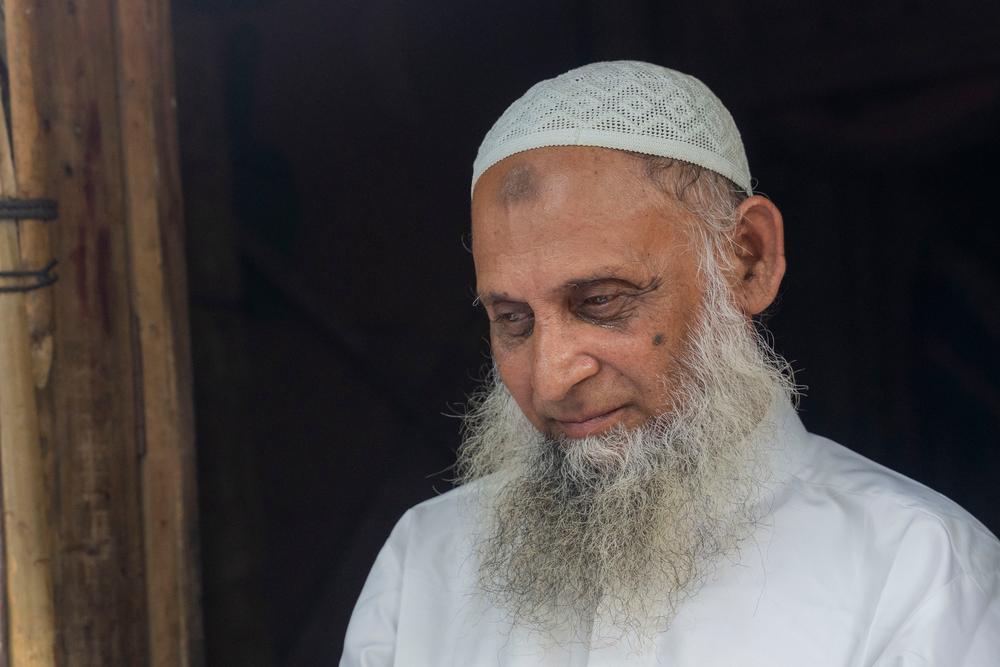
Razi, 65 years old, had a job as a government emoployee in Myanmar for more than 38 years. In 1982, he was stripped of his Myanmar citizenship because of his ethnicity as a Rohingya. Since then, Razi endured his rights and freedoms progressively taken away him. He was forced to flee to Bangladesh and has been in the camps for five years now. Bangladesh, 2022. © Saikat Mojumder/MSF


